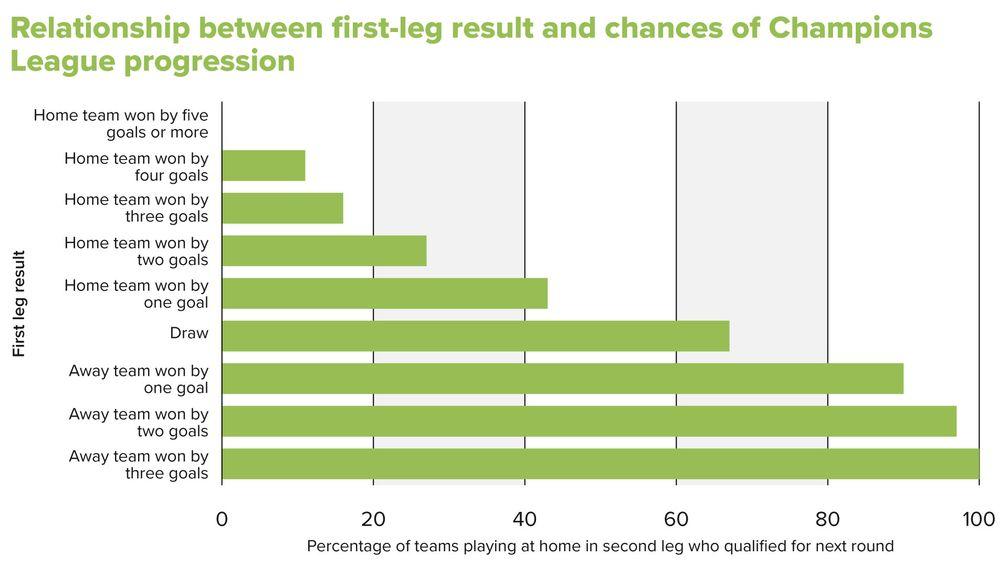What hope now for English teams in Champions League knockout ties?
Soccer Boffin Kevin Pullein offers his weekly dose of betting wisdom

No English team won their Champions League round of 16 first leg. The second legs start next week. Will there be any English teams in the quarter-finals?
I think the right answer is probably yes, and that the most likely number is two.
I say this for a couple of reasons. The first has nothing to do with the players or performances of English teams this season. Rather it comes from what happened in the past to others who found themselves in similar positions.
Liverpool lost at home by three goals, Chelsea and Tottenham lost away by one goal, Manchester City drew away. What became of others in such situations?
Is that a strange way to make predictions – to try to anticipate what somebody will do based on what somebody else has done? It is how others have made predictions about me throughout my life. And good predictions too.
When I was born a nurse could have told my parents when I was likely to reach a given weight or height, how long it might be before I could crawl, walk, talk. There is a lot of data on the development of children. Usually a perfectly acceptable prediction about what will happen to a child is the average of what happened to all of the children born before them.
I studied every two-legged knockout tie since the start of the Champions League, all those in the 30 completed seasons from 1992-93 to 2021-22.
The better a team did in the first leg the more likely they were to progress after the second leg. This is what we should have expected. A team who do well in the first leg are in a better position than a team who do badly. And normally a team who do well in the first leg will be stronger than a team who do badly – not every time but most times.
What, though, was the exact relationship between first and second legs? I set it out in the table below.

No team qualified for the next round after losing a first leg at home by more than two goals or away by more than four goals. Eleven per cent of teams qualified after losing away by four goals, 16 per cent after losing away by three goals, 27 per cent after losing away by two goals and 43 per cent after losing away by one goal. Sixty-seven per cent qualified after drawing away. Ninety per cent qualified after winning away by one goal and 97 per cent after winning away by two goals.
I believe those figures are a reasonable starting point for trying to assess what might happen in the future.
There was at least one potentially significant law change. Since last season away goals have not been a deciding factor if aggregate scores are level. This might have changed some things, but I feel now is too soon to say. Even without that law change there would be noise in the results. If I had taken data from another period, started a bit later maybe or finished a bit earlier, the table would be at least slightly different.
But if the averages from the last 30 seasons were to be reproduced this season there would be an 11 per cent chance of no English team reaching the quarter-finals, a 38 per cent chance of one team, a 39 per cent chance of two teams, a 12 per cent chance of three teams and a zero per cent chance of four teams.
In practice, of course, that last number could not be absolutely zero. There must be some possibility, even if it is only a tiny fraction of a per cent, for each outcome.
I said there were two reasons. The second modifies the first. It is used by nurses, and by a lot of other professionals. It takes you from the general to the specific.
When I had a mortgage the lenders insisted I had life insurance as well in case I died before I had paid them back. I had to fill in a long form. How old was I? Did I have a job? How much did I earn? Where was I going to live? I had already answered those questions on another form. Did I smoke? Did I drink?
With that information an actuary could probably have estimated pretty accurately the chance of my dying before I had cleared my debt. They would have done so by looking through records for the death ages of people who at one point in their life had given similar basic details.
There were a lot more questions, though. Did I have any illness? Was there a history of illness in my family? Did I go hang-gliding at weekends? On and on.
Seeing my answers to those questions the actuary might have wanted to tweak their original prediction. Was there anything that marked me out as different, a higher or lower risk than those to whom I had previously seemed similar?
Then of course they quoted a premium that grossly overstated any risk of their employers having to pay out.
I think Chelsea and Tottenham are fairly typical of Champions League teams who lost a first leg away by one goal. I think Manchester City are a bit better than most who drew away. I think Liverpool are a lot better than most who lost at home by three goals – though I also think Real Madrid are a good example of the sort of teams who win away by three goals.
So I will adjust my original figures. I will increase slightly my estimates for the chance of two, three and four English quarter-finalists, and reduce slightly those for one and none. Here are my finessed predictions for English quarter-finalists: a seven per cent chance of none, a 36 per cent chance of one, a 42 per cent chance of two, a 14 per cent chance of three and a one per cent chance of four. What do you reckon?
Sign up to emails from Racing Post Sport and get all the latest news and tips
Today's top sports betting stories
Follow us on Twitter @racingpostsport
Published on inOpinion
Last updated
- Mark Langdon: Premier League rollercoaster leaves me sick
- Patrick Madden: Joe Schmidt's revolution should ensure the Lions won't have it all their own way Down Under
- Simon Giles: How Chelsea have kept moving in the right direction
- Joe Casey: How the final league Merseyside derby at Goodison Park could shape up
- James Milton: Rooney and Lampard struggling to find golden touch as managers
- Mark Langdon: Premier League rollercoaster leaves me sick
- Patrick Madden: Joe Schmidt's revolution should ensure the Lions won't have it all their own way Down Under
- Simon Giles: How Chelsea have kept moving in the right direction
- Joe Casey: How the final league Merseyside derby at Goodison Park could shape up
- James Milton: Rooney and Lampard struggling to find golden touch as managers